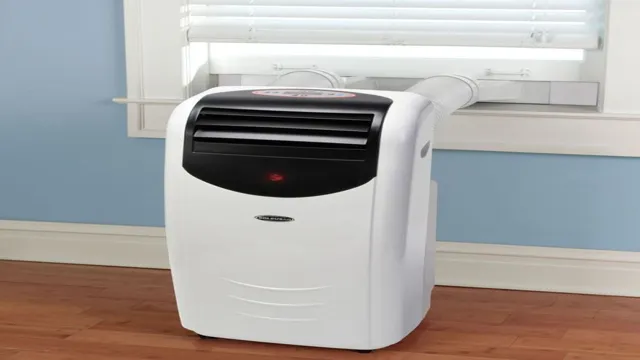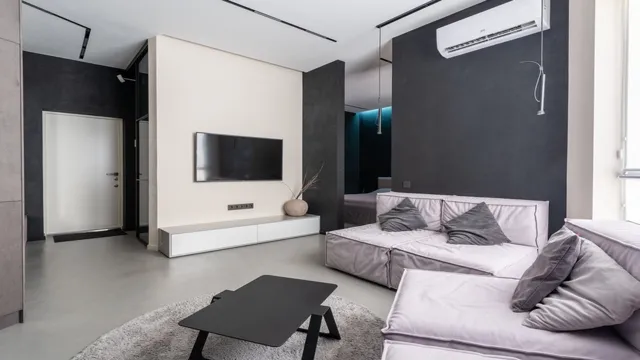Have you ever found yourself sweltering in your room during the hot summer months, despite having an air conditioner running? You’re not alone in this struggle. Many people face the same dilemma. But what if we told you there’s a solution that could help you cool your room more efficiently? Have you considered using two air conditioners in one room? In this blog post, we’ll explore the benefits and drawbacks of using two air conditioners, along with some tips to help you achieve a comfortable temperature in your room.
So, grab a cold drink and let’s dive in!
Room Size Considerations
If you’re wondering whether you can use 2 air conditioners in one room, the answer is a bit more complex than a simple yes or no. First and foremost, the size of the room plays a significant role in determining whether one or two air conditioners are necessary to cool the space adequately. A smaller room may only require one unit, while a larger room may need two units to effectively cool the entire area.
Additionally, the layout of the room and any obstructions, such as furniture or walls, can impact the overall cooling effectiveness of the air conditioners. It’s also important to consider the overall capacity of the air conditioning units, as using two units that don’t have enough BTUs to cool the room can result in wasted energy cost and wear and tear on the units. Ultimately, it’s best to consult with an HVAC professional to determine the best course of action for your specific room and cooling needs.
Calculate the Square Footage of the Room
When it comes to calculating the square footage of a room, there are a few things to keep in mind. First, you’ll need to measure the length and width of the room in feet using a measuring tape. Make sure to measure from wall-to-wall, not just from baseboard-to-baseboard.
Once you have these two measurements, simply multiply them together to get the total square footage of the room. For example, if your room measures 10 feet by 12 feet, the total square footage would be 120 square feet. It’s important to note that when considering the size of a room, you should also take into account the intended use of the space.
A small bedroom may feel cozy and intimate, whereas a small living room may feel cramped and uncomfortable. Conversely, a large bathroom may feel luxurious and spacious, whereas a large closet may feel unnecessary and wasteful. It’s all about finding the right balance between function and form.
So, whether you’re trying to determine how much paint you’ll need for a room, or simply want to get a better sense of the space you’re working with, calculating the square footage of a room is an important first step. By keeping in mind the intended use of the space and finding the right balance between form and function, you can ensure that your room feels both inviting and practical.

Determine the BTU Requirements for Each Unit
When choosing the ideal air conditioning unit for your space, it’s important to keep in mind the size of the room. The best way to determine the required BTU (British Thermal Unit) capacity is to calculate the square footage of the room and match it with the recommended BTU for that size. As a rule of thumb, a room that is around 150-350 square feet would require an air conditioner with 5,000-8,000 BTUs.
Larger rooms of around 450-550 square feet may need around 12,000 BTUs while anything over 700 square feet may require an air conditioner with a BTU capacity of 18,000 or higher. Keep in mind that factors like the number of windows, insulation, ceiling height, number of occupants, and the amount of electronic devices in the room can all impact the BTU requirements. Taking these factors into consideration can help you determine the ideal air conditioning unit for your room size, ensuring maximum comfort and efficiency.
Placement of Units
Can I use 2 air conditioners in one room? The answer is yes, but it is important to consider their placement to ensure efficient cooling and avoid wasted energy. It may seem logical to place one AC unit on each end of the room, but this can actually create pockets of uneven cooling and result in hot spots. Instead, consider placing both units on the same wall, ideally opposite each other, to create a consistent flow of cool air.
Additionally, make sure both units are properly sized for the room to avoid overworking and wearing out the units. With proper placement and sizing, using two AC units in one room can provide effective and comfortable cooling for larger spaces.
Avoid Placing Units Directly Across from Each Other
When it comes to placing units in a strategic game, one thing to keep in mind is to avoid placing them directly across from each other. This tip is particularly important in games where a unit placed directly across from another unit can attack it. Placing units directly across from each other creates a vulnerable situation where a small mistake can result in a major setback.
Instead, a player should focus on placing units in a way that allows them to support each other while limiting their opponent’s options. For example, a player might place units in a way that creates a “triangle” defense, where units are spaced apart in a way that creates a fortification that makes it difficult for the opponent to break through. By thinking strategically about unit placement, a player can gain a major advantage in the game.
So, next time you are playing a strategy game, keep in mind the importance of unit placement and avoid placing units directly across from each other.
Position Units to Cover Different Areas of the Room
When setting up a sound system in a large room, it’s important to strategically position your units in order to cover different areas of the room. This will ensure that sound is evenly distributed and that everyone in the room can enjoy high-quality audio. One way to do this is to place the units in opposite corners of the room, facing each other.
This will create a stereo effect and fill the space with music or sound. Another option is to position the units about one third of the way in from each side of the room, facing the center. This allows the sound to spread out and cover the entire area without being too overwhelming in any one spot.
Additionally, utilizing a mix of woofers and tweeters can help to further distribute the sound more evenly. Overall, taking the time to carefully consider the placement of your sound system units can make a big difference in creating an enjoyable listening experience for everyone.
Electrical Needs
Are you wondering if you can install two air conditioners in one room? Well, it’s possible, but you need to consider your electrical needs. Firstly, you need to ensure that your electrical system can handle the additional load. Most homes have a 15-amp circuit breaker for each room, and running two air conditioners on one circuit can cause a power overload.
Consider hiring an electrician to check your wiring and install a dedicated circuit breaker for the second air conditioner. It’s also crucial to make sure that your room can accommodate two air conditioners. Installing two units in a small room can lead to a drop in air quality, increased humidity, and energy inefficiency.
In larger spaces, you can position the units close to each other but not directly facing each other to prevent them from working against each other. In conclusion, adding a second air conditioner in a single room is possible but requires careful consideration of both your electrical needs and room dimensions.
Ensure Adequate Power Supply
When planning for any event or project that requires electrical services, it’s essential to ensure adequate power supply. A lack of enough power can lead to numerous complications, including cutting short the event or halting the project, causing unnecessary delays and expenses. Therefore, it’s vital to assess the electrical needs of the event or project and prepare adequately.
One way of achieving this is by hiring a professional electrician to perform a load analysis and identify the specific electrical requirements. Additionally, using generators can be a viable option to ensure continuity in case of power outages. Investing in high-quality electrical equipment can also help increase efficiency while reducing power consumption.
By taking time to plan and meet the electrical needs of the project or event, it’s possible to avoid unnecessary setbacks and ensure successful completion.
Consider Using a Surge Protector
If you’re like most people, you probably have a lot of electrical devices hooked up to the outlets in your home. From laptops and smartphones to kitchen appliances and TV sets, our modern lives rely heavily on electricity. But have you ever considered the potential risks of not protecting your devices with a surge protector? Electrical surges and power spikes can happen at any time, and they can damage or destroy your devices in the blink of an eye.
That’s why it’s essential to invest in a surge protector to keep your electronics safe. It works by diverting excess voltage away from your devices and then grounding it. That way, you can have peace of mind knowing that your electronics are protected from any sudden power surges or lightning strikes.
So, next time you’re setting up a new device in your home, be sure to consider a surge protector to keep it safe!
Conclusion
In conclusion, while using two air conditioners in one room may seem like a good idea for maximizing coolness, it’s important to consider the potential drawbacks like increased energy consumption and noise levels. Rather than doubling up on the AC units, try optimizing your current system by ensuring proper air flow and insulation. Remember, staying cool is important, but so is being smart and efficient with energy usage.
So, while the answer to “can I use 2 air conditioners in one room?” may technically be yes, the question you should be asking yourself is do you really need to?”
FAQs
Is it safe to use 2 air conditioners in one room?
Yes, it is safe to use 2 air conditioners in one room, but you need to ensure that the electrical circuits can handle the additional load.
Will using 2 air conditioners decrease energy efficiency?
Yes, using 2 air conditioners will increase energy consumption, which will decrease energy efficiency.
What is the ideal distance between 2 air conditioners in a room?
The ideal distance between 2 air conditioners in a room is at least 15 feet to avoid overlapping of airflows and uneven cooling.
Can using 2 air conditioners cause the room to become too cold?
Yes, using 2 air conditioners can cause the room to become too cold, which can be uncomfortable and may also increase energy consumption. It is best to maintain a temperature of 23-25°C.
How do I ensure proper installation of 2 air conditioners in one room?
To ensure proper installation of 2 air conditioners in one room, it is recommended to consult a professional installer who can assess the room size and ventilation, and suggest suitable placement for the air conditioning units.

